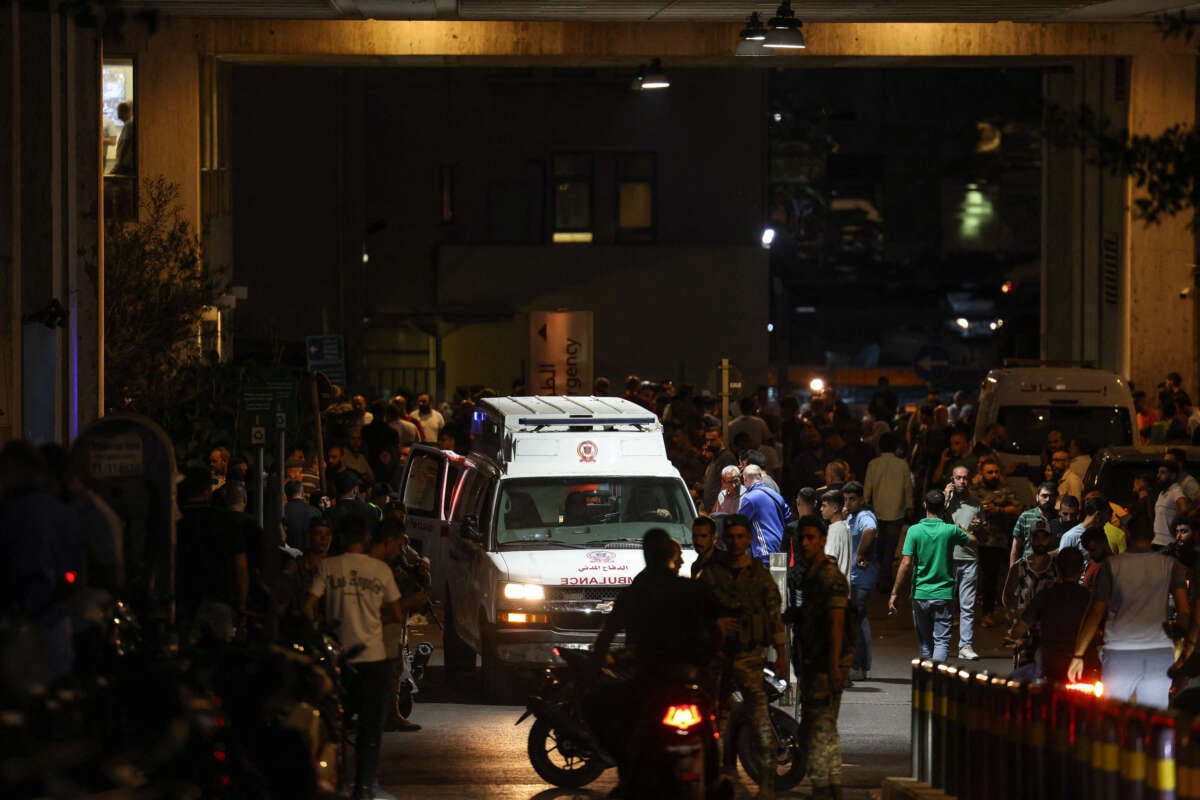People across Lebanon were hit with a second round of handheld device explosions on Wednesday, wounding over 450 people as hospitals are already overwhelmed with the scores of people injured across the country in a similar attack orchestrated by Israel the day before.
At least 14 people were killed by a wave of walkie talkie explosions, according to an initial count by Lebanon’s health ministry shortly after the attack. Homes and shops were set on fire by the blasts. Lebanon’s news agency also reported that solar energy systems had exploded.
Nowhere was safe from the explosions, indicating the indiscriminate nature of the attack. Explosions went off at a funeral for a child and three adults, including a paramedic, who were killed in the previous day’s attack.
Al Jazeera also reported on Wednesday that Lebanese forces found an explosive device in an ambulance at the American University of Beirut Medical Center, noting that communication devices like the ones exploded this week are used regularly by medical teams. It’s unclear if the explosive device is related to the walkie talkie explosions.
The attack came just after the ministry updated the death toll from Tuesday’s pager explosion attack to 12, including an 8-year-old girl and an 11-year-old boy, as well as four medical staff. Tuesday’s attack injured at least 2,750 people, overwhelming hospitals.
Wednesday’s attack will add to that load. The Lebanese Red Cross said that it was dispatching at least 30 ambulance teams in southern and eastern Lebanon in response to the explosions.
According to The Associated Press, a Hezbollah official anonymously said that the group used the walkie-talkies that exploded on Wednesday.
Both attacks, which human rights groups have said are likely war crimes, were probably carried out by Israel. The attacks are a massive escalation of Israel’s war on Hezbollah, an armed political bloc that rose to prominence during Israel’s 22-year occupation of southern Lebanon that formally ended in 2000.
Lebanon and Hezbollah have both blamed Israel for Tuesday’s attack, as Israel has been bombing civilians in Lebanon — including with white phosphorus munitions — and threatening escalation for months. Multiple news outlets have also reported that Israel was behind the pager explosions; CNN found that Tuesday’s attack was done by Israel’s intelligence agency, Mossad, and the Israeli military.
Israel appeared to take responsibility for the assault on Tuesday. Israeli Prime Minister Benjamin Netanyahu released a short video statement on social media after the walkie talkie explosions, simply saying, “I have already said we will return the residents of the north safely to their homes. And that is exactly what we will do.”
Tuesday’s attack came just hours after Israel announced a new war objective of stopping Hezbollah’s strikes on northern Israel and allowing Israeli residents to return to the region.
Additionally, though he made no mention of the explosions, Israeli Defense Minister Yoav Gallant told troops on Wednesday that Israel is entering a “new phase” of its war, amid its genocide in Gaza, and is seeking to “diver[t] resources and forces” toward its fight against Hezbollah in Lebanon.
The New York Times, citing American and other officials familiar with the operation, reports that the pagers were programmed to receive a message at 3:30 pm Lebanese time on Tuesday. Then, the explosive material and remote trigger implanted in the device caused the pager to explode. Axios reported U.S. officials have said that they were not briefed on the attack beforehand.
This lines up with the account of the death of 9-year-old Fatima Abdullah, who was killed in Tuesday’s attack. According to her aunt, the young girl picked up a pager from the table after it began beeping, aiming to bring it to her father. It exploded in her hand, “mangling her face and leaving the room covered in blood,” the Times reported.
“Fatima was trying to take courses in English,” the girl’s aunt said. “She loved English.”
UN Secretary-General Antonio Guterres called Tuesday’s attack a “dramatic escalation.” UN human rights chief Volker Türk called for an independent investigation into Tuesday’s attack, calling it “shocking” and “unacceptable” for its effect on civilians. He called on all states involved in the region to take immediate steps to de-escalate the situation and prevent an all-out war.
“Simultaneous targeting of thousands of individuals, whether civilians or members of armed groups, without knowledge as to who was in possession of the targeted devices, their location and their surroundings at the time of the attack, violates international human rights law and, to the extent applicable, international humanitarian law,” said Türk.
Human Rights Watch also called for an investigation, saying that the pager attack was an instance of a use of booby traps, which is against international humanitarian law because of its potential to harm civilians. The group said it reviewed footage in which the pagers were exploding in civilian areas like grocery stores, and videos from emergency rooms in which children had “severe penetrating traumatic injuries,” likely from the attack.
“The use of an explosive device whose exact location could not be reliably known would be unlawfully indiscriminate, using a means of attack that could not be directed at a specific military target and as a result would strike military targets and civilians without distinction. A prompt and impartial investigation into the attacks should be urgently conducted,” said Lama Fakih, Middle East and North Africa director at Human Rights Watch.
Media that fights fascism
Truthout is funded almost entirely by readers — that’s why we can speak truth to power and cut against the mainstream narrative. But independent journalists at Truthout face mounting political repression under Trump.
We rely on your support to survive McCarthyist censorship. Please make a tax-deductible one-time or monthly donation.
